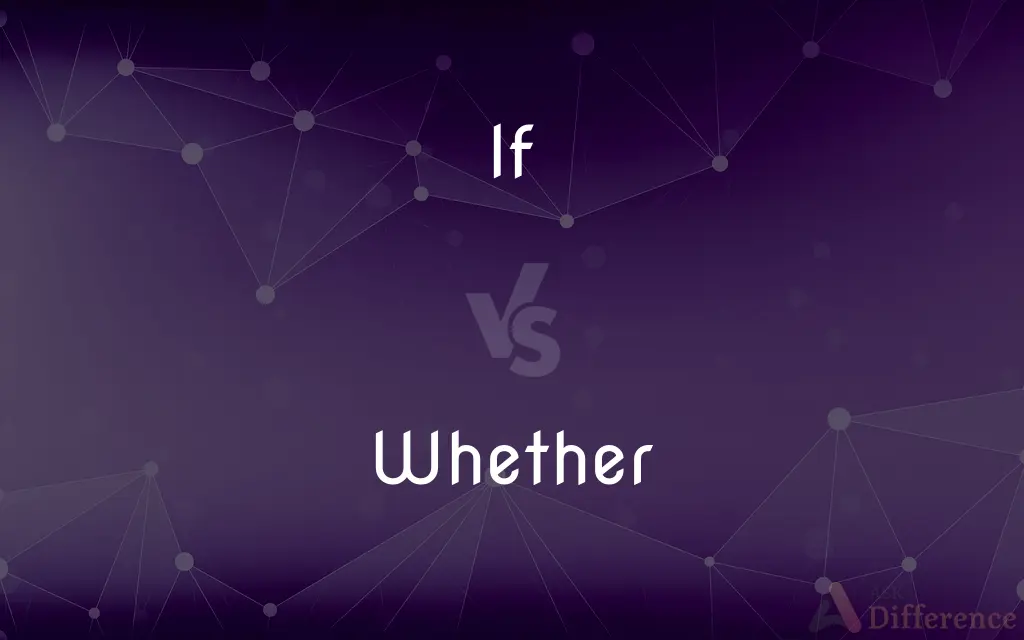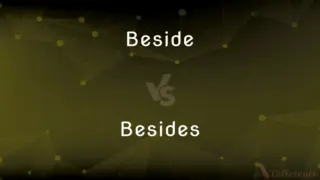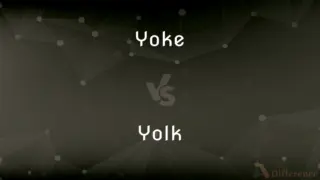If vs. Whether — What's the Difference?
By Tayyaba Rehman — Updated on September 23, 2023
"If" is used to introduce a condition or possibility, often followed by a result or consequence. "Whether" is used to express a choice or uncertainty between two or more options, and it doesn't imply a result.

Difference Between If and Whether
Table of Contents
ADVERTISEMENT
Key Differences
"If" is a conjunction used to introduce a condition or a possibility that must be met for something else to happen. For example, "if it rains, we will stay inside." "Whether," on the other hand, is used to introduce two or more alternatives or choices, without necessarily pointing to a result or outcome. For example, "I don't know whether to choose coffee or tea."
The word "if" often introduces a dependent clause that implies a cause-and-effect relationship. It sets up scenarios where one event is contingent on another. "Whether," however, usually introduces alternatives that are not dependent on an outcome. For instance, "I don't know whether it will rain," simply expresses uncertainty about rain, without specifying what would happen if it does.
In terms of syntax, "if" usually requires a complete clause to follow it, including a subject and a verb. "Whether" can be followed by an infinitive verb, such as "He can't decide whether to go." Both "if" and "whether" can be used in indirect questions, but "whether" is generally preferred in formal writing for this context.
The word "if" can sometimes be substituted with "whether," but not always. For example, you can say, "I don’t know if he's coming" or "I don't know whether he's coming," both are correct. However, the choice between "if" and "whether" can change the nuance or formality of the sentence.
Comparison Chart
Introduces
Condition
Choice or Uncertainty
ADVERTISEMENT
Implies
Result or Consequence
No implied result
Syntax
Followed by a complete clause
Can be followed by an infinitive
Use in Indirect Questions
Possible but less formal
Preferred in formal writing
Nuance
Generally more casual
Generally more formal
Compare with Definitions
If
"If" can indicate a requirement that must be fulfilled.
You can enter the contest if you are over 18.
Whether
"Whether" is commonly used in indirect questions in formal writing.
She asked whether you would be attending the conference.
If
"If" can express an assumption or premise.
If that's the case, we should reconsider our plans.
Whether
"Whether" can be followed by an infinitive verb.
He's wondering whether to accept the offer.
If
"If" is used to introduce a condition that leads to a certain outcome.
If you finish your work, you can go outside.
Whether
"Whether" often appears in expressions like "whether or not."
I'm going whether or not you decide to join me.
If
"If" can be used in indirect questions, although less formally.
I don't know if she will come to the party.
Whether
Whether" is used to indicate a choice between two or more alternatives.
She couldn't decide whether to go to college or start working.
If
In the event that
If I were to go, I would be late.
Whether
"Whether" can express uncertainty or doubt.
I'm not sure whether he'll agree to the terms.
If
Granting that
If that is true, what should we do?.
Whether
Used in indirect questions to introduce one alternative
We should find out whether the museum is open. See Usage Notes at doubt, if.
If
On the condition that
She will play the piano only if she is paid.
Whether
Used to introduce alternative possibilities
Whether she wins or whether she loses, this is her last tournament.
If
Although possibly; even though
It is a handsome if useless trinket.
Whether
Either
He passed the test, whether by skill or luck.
If
Whether
Ask if he plans to come to the meeting.
Whether
(obsolete) Which of two.
If
Used to introduce an exclamatory clause, indicating a wish
If they had only come earlier!.
Whether
(obsolete) Which of two.
If
A possibility, condition, or stipulation
There will be no ifs, ands, or buts in this matter.
Whether
(obsolete) Introduces a direct question between alternatives (often with correlative or).
If
Supposing that, assuming that, in the circumstances that; used to introduce a condition or choice.
If it rains, I shall get wet.
I'll do it next year —if at all.
Whether
Indicates doubt between possibilities (usually with correlative or).
He chose the correct answer, but whether by luck or by skill I don't know.
If
(computing) In the event that a statement is true (a programming statement that acts in a similar manner).
If A, then B, else C.
Whether
Without a correlative, introduces a simple indirect question.
Do you know whether he's coming?
If
Supposing that; used with past or past perfect subjunctive indicating that the condition is closed.
I would prefer it if you took your shoes off.
I would be unhappy if you had not talked with me yesterday.
If I were you, I wouldn't go there alone.
Whether
Introduces a disjunctive adverbial clause qualifying the main clause (with correlative or).
He's coming, whether you like it or not.
Whether or not you're successful, you can be sure you did your best.
If
Supposing that; given that; supposing it is the case that.
If that's true, we had better get moving!
Whether
Which (of two); which one (of two); - used interrogatively and relatively.
Now choose yourself whether that you liketh.
One day in doubt I cast for to compareWhether in beauties' glory did exceed.
Whether of them twain did the will of his father?
If
Although; used to introduce a concession.
He was a great friend, if a little stingy at the bar.
Whether
In case; if; - used to introduce the first or two or more alternative clauses, the other or others being connected by or, or by or whether. When the second of two alternatives is the simple negative of the first it is sometimes only indicated by the particle not or no after the correlative, and sometimes it is omitted entirely as being distinctly implied in the whether of the first.
And now who knowsBut you, Lorenzo, whether I am yours?
You have said; but whether wisely or no, let the forest judge.
For whether we live, we live unto the Lord; and whether we die, we die unto the Lord; whether we live therefore, or die, we are the Lord's.
But whether thus these things, or whether not;Whether the sun, predominant in heaven,Rise on the earth, or earth rise on the sun, . . . Solicit not thy thoughts with matters hid.
If
Whether; used to introduce a noun clause, an indirect question, that functions as the direct object of certain verbs.
I don't know if I want to go or not.
If
Even if; even in the circumstances that.
If
Introducing a relevance conditional.
I have leftover cake if you want some.
If
(informal) An uncertainty, possibility, condition, doubt etc.
If
In case that; granting, allowing, or supposing that; - introducing a condition or supposition.
Tisiphone, that oft hast heard my prayer,Assist, if Œdipus deserve thy care.
If thou be the Son of God, command that these stones be made bread.
If
Whether; - in dependent questions.
Uncertain if by augury or chance.
She doubts if two and two make four.
If
"If" can denote a hypothetical situation or possibility.
If I were rich, I would travel the world.
Common Curiosities
When do you use If?
"If" is used to introduce conditions or possibilities that lead to specific outcomes.
Can If and Whether be used interchangeably?
Sometimes, but not always, as they introduce different types of clauses.
Does Whether imply a result?
Generally, no. "Whether" expresses choices without necessarily implying a result.
Is Whether used in negative sentences?
"Whether" can be used in negative sentences to express doubt or uncertainty.
Does If always imply a result?
Usually, "if" sets up a condition that implies a result or consequence.
Is Whether considered formal?
"Whether" is often preferred in formal writing, especially in indirect questions.
What does If introduce?
"If" introduces a condition that usually leads to a certain outcome or result.
Can Whether start a sentence?
Yes, "whether" can start a sentence, particularly in formal writing.
When do you use Whether?
"Whether" is used to indicate choices or uncertainties between alternatives.
Is If used in formal writing?
"If" can be used in both formal and informal contexts, but it's generally less formal than "whether" in indirect questions.
Can Whether be followed by an infinitive?
Yes, "whether" can be followed by an infinitive verb, like "whether to go."
Can If be used in indirect questions?
Yes, although "whether" is generally preferred in formal writing for indirect questions.
Does If require a complete clause?
Yes, "if" usually requires a complete clause to follow it.
Are If and Whether both conjunctions?
Yes, both "if" and "whether" are conjunctions used to introduce subordinate clauses.
What does Whether introduce?
"Whether" introduces a choice or uncertainty between two or more alternatives.
Share Your Discovery

Previous Comparison
Beside vs. Besides
Next Comparison
Yoke vs. YolkAuthor Spotlight
Written by
Tayyaba RehmanTayyaba Rehman is a distinguished writer, currently serving as a primary contributor to askdifference.com. As a researcher in semantics and etymology, Tayyaba's passion for the complexity of languages and their distinctions has found a perfect home on the platform. Tayyaba delves into the intricacies of language, distinguishing between commonly confused words and phrases, thereby providing clarity for readers worldwide.














































